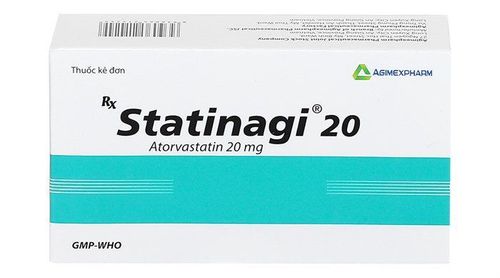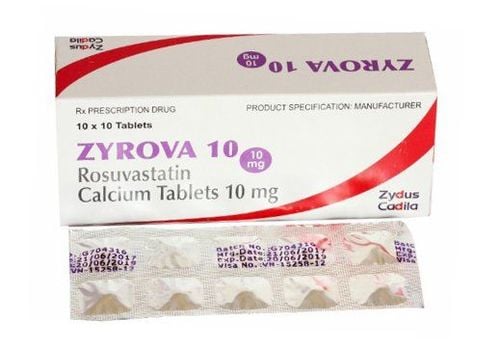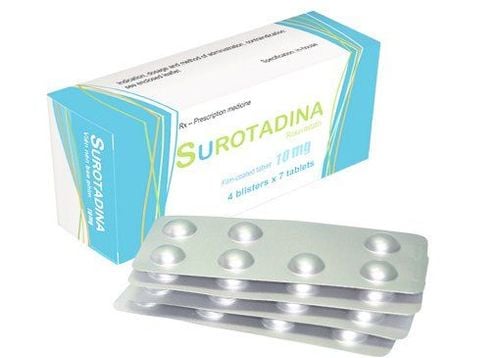This is an automatically translated article.
Pravacor belongs to the group of cardiovascular drugs. With the main ingredient Pravastatin, Pravacor is used in the supportive treatment and primary and secondary prevention in people with hypercholesterolemia.
1. Uses of the drug Pravacor
Pravacor is made in the form of tablets and is indicated for use in the following cases:
Supportive treatment in patients with primary hypercholesterolemia (types IIa, IIb) when applying diet and exercise. and lose weight but not effective. Pravacor is also used for primary prevention in patients with moderate or severe hypercholesterolaemia who have no clinically apparent symptoms and are at high risk for cardiovascular disease. This therapy is also used as an adjunct to diet to reduce the risk of death. In addition, Pravacor 10 is also used for secondary prevention in patients with a history of unstable angina or myocardial infarction but with normal or high blood cholesterol. This therapy is also used to support the correction of risk factors in patients to reduce the risk of death. Pravacor 10 is used after organ transplant surgery to reduce hyperlipidemia in patients taking immunosuppressive drugs.
2. Usage and dosage of Pravacor
Pravacor is used orally, take the pill whole with water, it should be taken in the evening, can be taken on an empty stomach or full. The use of cardiovascular drugs of the statin group should follow the instructions of the doctor, specifically:
Before treatment: The patient should be excluded the causes of secondary hyperlipidemia. During treatment: Patients need to follow and maintain a diet and limit cholesterol in meals. Dosage of Pravacor is adjusted according to the patient's ability to respond and needs, increasing the dose in batches and at intervals of about 4 weeks until the maximum dose is reached or the desired concentration of cholesterol - LDL is achieved. .
The recommended dose of Pravacor is as follows:
Supportive treatment of hypercholesterolemia: 10 - 40mg/time/day, within 1 week after taking the drug or up to 4 weeks will see a response to the treatment. Dosage adjustments are based on lipid levels checked periodically, but ensure a maximum dose of 40 mg/day. Cardiovascular prophylaxis: 40mg/time/day. Treatment after organ transplant surgery: The starting dose of Pravacor is 20mg/time/day in patients taking immunosuppressive drugs. The dose can be increased to 40 mg/time/day, but it depends on the patient's lipid profile and if this dose is used, the patient should be closely monitored. Treatment of heterozygous familial hypercholesterolemia in children under 18 years of age: Children aged 8-13 years use Pravacor at a dose of 10-20 mg/time/day, children aged 14-18 years take a dose of 10-40mg/day. times/day. For some special groups of subjects, the recommended dose adjustment is as follows:
Elderly patients: No dose adjustment of Pravacor is required unless there are associated risk factors for serious disease. Patients with hepatic impairment, renal failure: Patients with hepatic impairment, moderate and severe renal impairment use the initial dose of 10mg/time/day, then the dose is adjusted depending on the lipid index and the doctor's instructions. Pravacor is also used in combination with some other drugs to increase the effectiveness of treatment. The combined dose is as follows:
With Cholestyramine/Colestipol: Increases the effectiveness of lipid lowering on total cholesterol and LDL - cholesterol. Pravacor should be taken 1 hour before or 4 hours after taking these medicines. With cyclosporin with or without other immunosuppressive agents: The initial dose of Pravacor is 20 mg once daily and then adjusted to 40 mg once daily but should be done with caution. With protease inhibitors: The dose of Pravacor 10 is not limited when co-administered with protease inhibitors in the treatment of hepatitis C or HIV such as Atazanavir or Atazanavir and Ritonavir, or Darunavir and Ritonavir, or Lopinavir and Ritonavir. Information on Pravacor overdose is limited, a few cases of overdose were recorded but no special symptoms and most patients recovered without leaving any sequelae. In case of overdose, the patient should receive supportive treatment and symptomatic treatment if necessary.
3. Side effects of the drug Pravacor
Pravacor medicine can cause some unwanted side effects with the frequency of occurrence as follows:
Uncommon: Headache, dizziness, insomnia, sleep disturbance, abdominal pain, flatulence, heartburn, indigestion, constipation, nausea, vomiting, diarrhea; hives, skin rash, itching, hair loss; difficulty urinating, frequent urination at night; sexual dysfunction; myalgia, arthralgia, muscle spasticity, muscle weakness, increased plasma creatine kinase and serum transaminase concentrations. The drug Pravacor very rarely causes side effects such as paresthesia, peripheral polyneuritis; hypersensitivity reactions; pancreatitis, hepatitis, jaundice, hepatocellular necrosis; polymyositis, myositis, paroxysmal globinuria leading to secondary acute renal failure. If there are any unusual symptoms after taking Pravacor, the patient should immediately report it to a doctor or go to a medical facility soon for a health check.
4. Some notes when using Pravacor
Before treatment with Pravacor, the patient should be tested for liver enzymes, especially in cases of clinical indications in patients with renal failure, hypothyroidism, a history of muscle toxicity with statins or fibrates , has a personal or family history of hereditary muscle disorders, or a history of liver disease, alcoholism, elderly patients (over 70 years of age) with predisposing factors for rhabdomyolysis, drug interactions. If taking Pravacor, the patient should be closely monitored. When the CK concentration is higher than 5 times the normal value, it should not be treated, after 5-7 days need to conduct the test again. During treatment with Pravacor, if there are symptoms such as muscle weakness, muscle stiffness, muscle pain, the patient should immediately report to the doctor for a timely CK test to take measures to treat or intervene. matching card. Women of childbearing age who use contraception and are definitely not pregnant can be treated with Pravacor, and only when the patient has been treated with other drugs but does not lower blood cholesterol. People with a history of lactase deficiency, galactose intolerance or glucose-galactose malabsorption should not take Pravacor 10 because the composition of the drug contains lactose. Women who are pregnant or breast-feeding should not take Pravacor because of its dangerous effects on the fetus and newborn. Consider driving, operating, or operating machinery while taking Pravacor 10 because although the effect is small, the drug can also cause dizziness. Concomitant administration of Pravacor with Fibrates may increase muscle toxicity. Therefore, these two drugs should not be used at the same time, if necessary, the CK concentration should be monitored in the patient. Concomitant use of Pravacor with Cholestyramine/Colestipol may reduce the bioavailability of the drug. Therefore, Pravacor should be taken 1 hour or 4 hours after Cholestyramine, or 1 hour before Colestipol. Concomitant administration of Pravacor with ciclosporin may result in a 4-fold increase in pravastatin concentrations. Therefore, if these two drugs must be used in combination, it is necessary to check the biochemical indicators and clinical symptoms of the patient. Concomitant use of Pravacor with antibiotics of the macrolide group may increase the AUC and Cmax of the active ingredient pravastatin in the drug. Therefore, caution should be exercised when taking these drugs together. Concomitant use of Pravacor with Colchicine may increase the risk of rhabdomyolysis or myopathy; with Niacin increases the risk of effects on muscles and bones. Therefore, consider dosing Pravacor when co-administered with Niacin. Concomitant administration of Pravacor with protease inhibitors may result in a significant increase in serum statin concentrations; with medicines for hepatitis C or HIV can increase the risk of muscle damage, rhabdomyolysis, nephrotic syndrome and lead to kidney failure, and eventually death. The use of Pravacor is to reduce blood fat in patients who have applied weight loss, diet, exercise or other treatment measures but have not been effective. It is also used as a prophylactic to reduce the risk of death from cardiovascular diseases.
Please dial HOTLINE for more information or register for an appointment HERE. Download MyVinmec app to make appointments faster and to manage your bookings easily.













